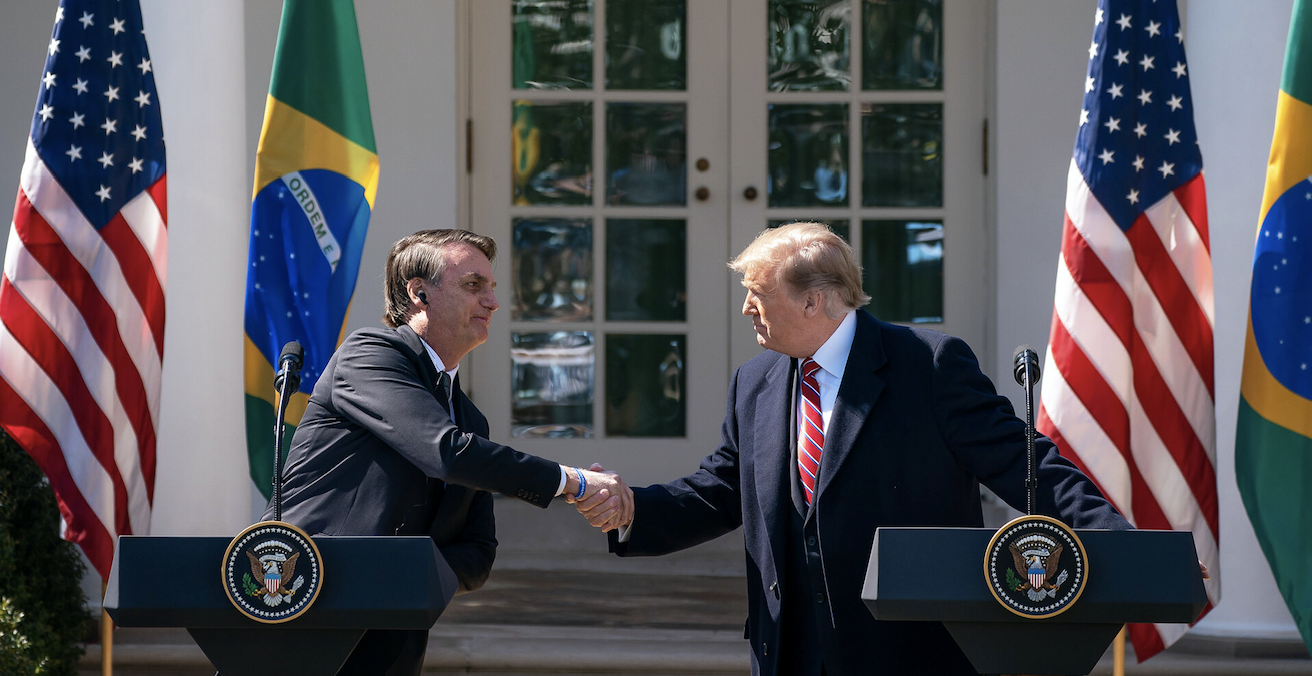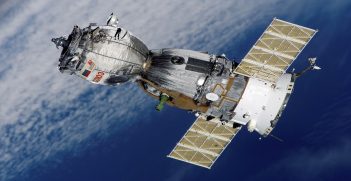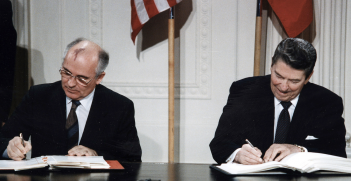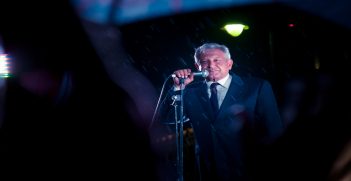The Trump-Bolsonaro Strategic Alignment

Brazilian President Jair Bolsonaro recently returned from state visits to the United States and Israel. In President Trump and Prime Minister Netanyahu, he found natural allies for the establishment of strategic alliances.
In March, Brazilian President Jair Bolsonaro paid his first official visit to Washington. Deemed by many to be the “Trump of the tropics,” Bolsonaro’s “big Brazil” narrative echoes President Trump’s “make America great again” populist slogan. While ties between the Bolsonaro and Trump administrations may be growing, they are not a new development. The two populist presidents started forging ties during Bolsonaro’s presidential race last year. In August 2018, Bolsonaro’s son Eduardo Bolsonaro, who is also a Brazilian congressman, tweeted: “It was a pleasure to meet Steve Bannon, strategist in Donald Trump’s presidential campaign. We had a great conversation and we share the same worldview. He said be an enthusiast of Bolsonaro’s campaign [sic] and we are certainly in touch to join forces, especially against cultural Marxism.” It now appears that Bolsonaro’s recent visit to Washington has consolidated the Bolsonaro-Trump ideological platform with increased foreign policy and strategic alignment.
Strategic alignment
It became apparent Trump and Bolsonaro were moving to increase cooperation between Brazil and the United States during a joint press conference they held in Washington on 19 March. President Trump stated: “Brazilians and Americans share similar values,” including “an enduring love for faith, family and country.” President Trump said a “thriving relationship between Americans and Brazilians is fundamental for the future of security and prosperity in the region,” and declared he will have a “fantastic working relationship with Bolsonaro as they have many views which are similar.” President Trump also designated Brazil as a major non-NATO strategic ally, and said he is considering Brazil for future NATO membership, declaring such a move will advance Brazil-US security and cooperation in the region. Finally, President Trump said he is reviving the US-Brazil CEO forum and has vowed to support Brazil’s bid to join the Organisation for Economic Co-operation and Development.
Matching Trump’s resolve, Bolsonaro stated “his visit to the US not only consolidates Brazil-US relations but opens a new chapter on this relationship,” declaring Brazil and the United States will increase intelligence sharing and strategic cooperation in the region. He also announced a visa exemption agreement with the United States allowing US citizens and those of their strategic allies (Australia, Canada and Japan) to enter Brazil without a visa. This unilateral measure is unprecedented in Brazil’s foreign policy. President Bolsonaro argued this will facilitate foreign investment, business and tourism in the country. Finally, Bolsonaro launched a Brazil-US energy forum promoting gas, oil and energy cooperation.
During his visit, Bolsonaro also signed a technological safeguards agreement allowing US companies to conduct space launches from Brazil. Under the agreement, the United States will be able to launch its satellites from the Alcantara military base in Brazil’s northern region of Maranhão. This highly strategic military base is located near the equator and can be used to launch US satellites – a move that will save US companies up to 30 percent on fuel costs. The United States has been pushing for such a move for some time. In 2000, President Fernando Henrique Cardoso’s administration attempted to seal a similar agreement. However, it failed to gain approval in the Brazilian Congress. Notably, Bolsonaro, who was serving as a congressman at the time, voted against the move. For now, Bolsonaro has only signed the agreement and it still requires approval by the Brazilian Congress before it is finalised.
The two leaders also share similar positions on the Venezuela crisis. President Bolsonaro was one of the first leaders to recognise the opposition leader Juan Guaidó as Venezuela’s interim president. The Trump administration backed Guaidó shortly afterwards and continues to work towards President Nicolaas Maduro’s removal from office. President Bolsonaro recently declared “all options are on the table” for dealing with the Venezuelan crisis, a position which supports US posturing in the region and the Trump administration’s refusal to rule out military intervention to settle the crisis.
A dinner hosted by the Brazilian ambassador to Washington, Sergio Amaral, brought together businessmen, journalists and ultraconservative leaders such as Brazil’s right-wing ideologue Olavo de Carvalho and Trump’s former strategist Steve Bannon. At this dinner, Bolsonaro declared his wish to “make Brazil great as Trump wishes to make America great again.” The Bolsonaro-Trump ideological symmetry signals an increasing Brazil-US strategic alignment, which might take Brazil and Latin America back to the times of the now defunct, Monroe Doctrine.
Bolsonaro, Trump and Israel
Soon after his trip to Washington, Bolsonaro paid his first official visit to the state of Israel. Following Trump’s move in giving unconditional support to Israel, Bolsonaro declared he will open a business liaison office in Jerusalem. While it is noted Brazil’s business liaison office in Jerusalem is not diplomatic in character, this could be Brazil’s first move towards recognition of Jerusalem as the capital of Israel. However, this is not an unexpected development as one of Bolsonaro’s campaign promises was to shift Brazil’s Embassy from Tel Aviv to Israel. Regarding the Brazilian-Israeli relationship, Bolsonaro said: “In a great wedding we always start with dating and then engagement. We [Brazil and Israel] are on the right track.” In an unprecedented move, Bolsonaro prayed with Israeli Prime Minister Benjamin Netanyahu at the Wailing Wall in Jerusalem. Brazil’s positioning on the Israeli-Palestinian conflict was criticised by the Palestinian Authority and Brazilian Palestinians. In response, Eduardo Bolsonaro sparked controversy by tweeting: “Hamas, I want you all to blow up.” It appears the younger Bolsonaro has since deleted the tweet after it sparked public outrage.
During his visit to Israel, Bolsonaro also attended a meeting with Brazilian and Israeli business leaders to encourage Israeli foreign investment in Brazil. Speaking to members of the press, Bolsonaro confirmed a controversial interpretation of Nazism espoused by his foreign minister; when asked if Nazism was a left-wing ideology, Bolsonaro replied, “there is no doubt, right?” This controversial interpretation of the rise of Nazism in Germany and the ideology behind the Holocaust is widespread in Bolsonaro’s far-right administration. Recently, Brazil’s Minister for Foreign Affairs Ernesto Araujo stated: “totalitarian regimes such as Fascism and Nazism are a left-leaning phenomenon.”
In a further controversial move, Bolsonaro recently instructed his country’s defence forces to commemorate the military coup of 31 March 1964 which ushered in 21 years of military dictatorship in Brazil. Bolsonaro argues Brazil’s ruthless military regime was not a dictatorship, but rather “a strong regime supported by Brazil’s population in the fight against totalitarianism.’ In addition, Bolsonaro’s education minister, Ricardo Velez Rodriguez, recently declared Brazil’s national curriculum will go through progressive changes and history books will include a “broader” interpretation of the 1964 regime change, where the military dictatorship will be described as a “democratic regime consolidated via strength.” These statements have received much criticism from Brazilian and international historians. Regrettably, Bolsonaro’s ideological crusade indicates Orwellian “new speech” narratives are increasingly becoming the new normal in Brazilian politics. Worryingly, it is also now clear that the Bolsonaro administration’s ideological agenda is starting to impact not only Brazil’s domestic affairs but also its foreign policy in the region and further afield.
Flavia Bellieni Zimmermann is a Phd candidate in the Centre for Muslim States and Societies at the University of Western Australia. She is also an intern with AIIA WA. She holds a Bachelor of Laws with Honours from the Pontifical Catholic University in Rio de Janeiro and a Graduate Diploma of International Relations and National Security from Curtin University, Western Australia.
This article is published under a Creative Commons License and may be republished with attribution.





